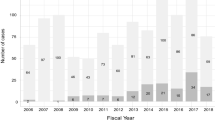Abstract
Procedural rights are an essential tool for guaranteeing that the rule of law is respected in competition cases. This applies both in merger cases, where the competition authority needs to clear the merger before it takes effect (ex ante cases), and in infringement cases, where the competition authority sanctions an infringement that already took place (ex post cases). In both cases, stakes for the undertakings are high. The clearance (or non-clearance) of a merger determines the future profit-making ability of an undertaking. In infringement cases, sanctions tend to be severe, which may be reflected in share value and may have an impact on the image of the undertaking. Differences in procedural rights may hamper international cooperation between competition authorities. Moreover, weak or non-existing procedural rights may have an impact on the readiness of international undertakings to enter the market in question.
Access this chapter
Tax calculation will be finalised at checkout
Purchases are for personal use only
Similar content being viewed by others
Notes
- 1.
Cf. infra, contribution by M. Albers.
- 2.
- 3.
- 4.
Kallay (2008).
- 5.
- 6.
- 7.
Zhang and Zhang (2010).
- 8.
See, e.g., Case 33/76, Rewe v Landwirtschaftskammer Saarland, [1976] ECR 1989, para 5; Case 45/76, Comet v Produktschap voor Siergewassen, [1976] ECR 2043, para 13 and 16.
- 9.
Directive 2014/104/EU of the European Parliament and of the Council of 26 November 2014 on certain rules governing actions for damages under national law for infringements of the competition law provisions of the Member States and of the European Union, O.J. L 349, 5.12.2014, pp. 1–19.
References
Anderson D, Cuff R (2011) Cartels in the European Union: procedural fairness for defendants and claimants. Fordham Int Law J 34:385–430
Andreangeli A (2005) The protection of legal professional privilege in EU law and the impact of the rules on the exchange of information within the European Competition Network on the secrecy of communications between lawyer and client: one step forward, two steps back? Competition Law Rev 2(1):31–54
Andreangeli A (2008) EU competition enforcement and human Rights. Edward Elgar, Cheltenham
Bellamy C (2012) ECHR and competition law post Menarini: an overview of EU and national case law. e-Competitions, N°47946, 5 July 2012
Bronckers M, Vallery A (2011) No longer presumed guilty? The impact of fundamental rights on certain dogmas of EU competition law. World Competition 34(4):535–570
Emch A, Hao Q (2007) The New Chinese Anti-Monopoly Law – an overview https://www.competitionpolicyinternational.com/file/view/486
Forrester IS (2009) Due process in EC competition cases: a distinguished institution with flawed procedures. Eur Law Rev 34:817
Giannakopoulos T (2004) Safeguarding companies’ rights in competition and antidumping/anti-subsidies proceedings. Kluwer Law International, The Hague
Han M, Wang J (2014) Due process in Chinese competition law regime. CPI Chronicle 6(1)
Harris HS (2014) Due process and procedural rights under China Anti-Monopoly law. CPI Chronicle 6(1)
Kallay D (2008) China’s new anti-monopoly law: an international antitrust convergence perspective, Remarks delivered at Melbourne Law School’s “Unleashing the Tiger? Competition Law in China and Hong Kong” Conference Melbourne, Australia. http://www.ftc.gov/oia/speeches/081004kallaymelbourne.pdf
Lenaerts K, Vanhamme J (1997) Procedural rights of private parties in the community administrative process. Common Mark Law Rev 34:531–569
MacCulloch A (2006) The privilege against self-incrimination in competition investigations: theoretical foundations and practical implications. Leg Stud 26(2):211–237
Nazzini R (2005) Some reflections on the dynamics of the due process discourse in EC competition law. Competition Law Rev 2(1):5–30
Tran Thiet J-P (2010) Les principes du process équitable face aux procédures de concurrence. Concurrences: 10–12
Veenbrink M (2015) The privilege against self-incrimination in EU competition law: a deafening silence? Leg Issues Econ Integration 42(2):119–142
Venit JS (2009) Human all too human: the gathering and assessment of evidence and the appropriate standard of proof and judicial review in commission enforcement proceedings applying Articles 81 and 82. Eur Competition Law Annu: 191–253
Wils WPJ (2011) EU Anti-trust Enforcement Powers and Procedural Rights and Guarantees: The Interplay between EU Law, National Law, the Charter of Fundamental Rights of the EU and the European Convention on Human Rights. World Competition 34(2):189–213
Wils WPJ (2012) The oral hearing in competition proceedings before the European Commission. World Competition 35(3):397–430
Wils WPJ (2014) The compatibility with fundamental rights of the EU Antitrust Enforcement System in which the European Commission acts both as investigator and as first-instance decision maker. World Competition 37(1):5–25
Wils WPJ (2004) The combination of the investigative and prosecutorial function and the adjudicative function in EC antitrust enforcement: a legal and economic analysis. World Competition 27(2):201–224
Zhang X, Zhang VY (2010) Chinese merger control: patterns and limitations. J Competition Law Econ 6(2):477–496
Author information
Authors and Affiliations
Corresponding author
Editor information
Editors and Affiliations
Rights and permissions
Copyright information
© 2016 Springer-Verlag Berlin Heidelberg
About this chapter
Cite this chapter
Cauffman, C., Hao, Q. (2016). Introduction. In: Cauffman, C., Hao, Q. (eds) Procedural Rights in Competition Law in the EU and China. China-EU Law Series, vol 3. Springer, Berlin, Heidelberg. https://doi.org/10.1007/978-3-662-48735-8_1
Download citation
DOI: https://doi.org/10.1007/978-3-662-48735-8_1
Published:
Publisher Name: Springer, Berlin, Heidelberg
Print ISBN: 978-3-662-48733-4
Online ISBN: 978-3-662-48735-8
eBook Packages: Law and CriminologyLaw and Criminology (R0)




